Cris Williamson: A Pioneer in Women's Music
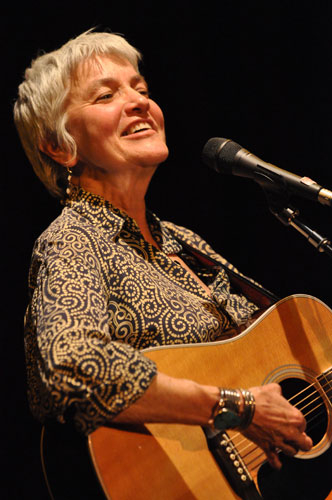
Cris Williamson brought her inclusive style of performing to the Cafe 939 stage.
Photo by Phil Farnsworth
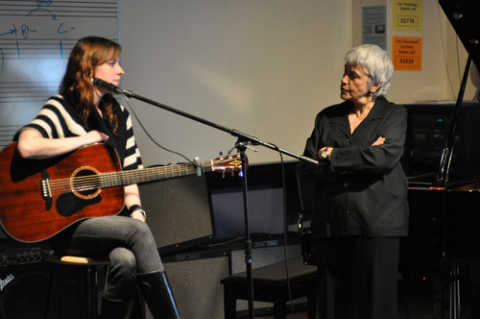
Williamson offers Kathryn Baar a critique of her song "Far From Strangers" during Jon Aldrich's Singer/Songwriter Workshop.
Photo by Phil Farnsworth
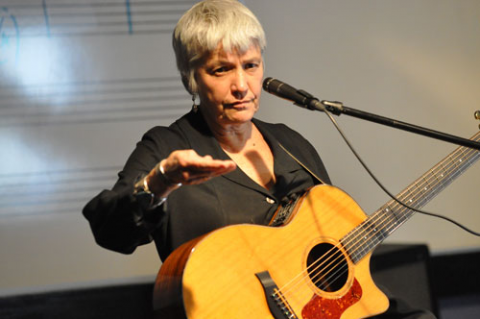
Williamson gives students advice about performing and songwriting.
Photo by Phil Farnsworth

Rhiannon, Didi Stewart, and Cris Williamson talk about the emergence of the women's music movement at the Women in Music Panel. Beth Denisch, far right, moderates.
Photo by Craig Reed
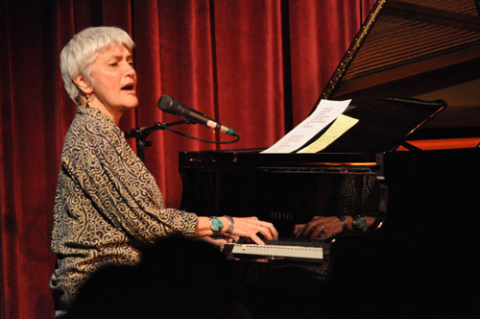
Williamson performs at Cafe 939.
Photo by Phil Farnsworth
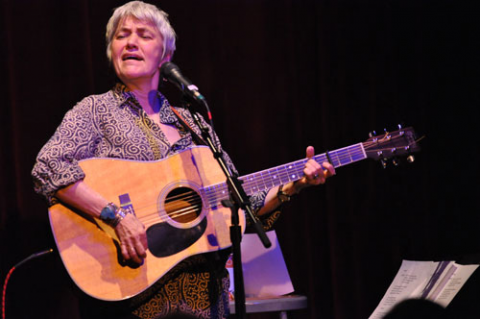
"Never give up," Williamson tells the audience. "Because you may be a far-flung dream for some other heart, some other mind that didn't quite get to do it."
Photo by Phil Farnsworth
The students bared their souls and put their lyrics and music before their peers, professor, and a special guest whose four decades as a pioneering singer/songwriter added a valuable voice to the table.
"Your pitch is gorgeous," Cris Williamson told Evan Anderson in Jon Aldrich's Singer/Songwriter Workshop, one of a half-dozen classes the folk and indie music icon attended during her residency at Berklee. She chimed in to critique students' works, as is customary in that class. "You took us on a journey," she added, complimenting Anderson's guitar playing and vocals. Her advice: Open your eyes more ("There's something about opening the eyes that pulls us out of reverie and deepens our engagement with a human being.") and stand while you perform ("Sitting is good but standing is powerful").
Kathryn Baar impressed with her hauntingly beautiful lyrics, with gems such as "cradling babies in my mouth" and a "a scissor to my noose." Williamson advised her to enunciate her words. "This is full of gorgeous imagery. Deliver it."
The students listened with rapt attention to Williamson, a pioneer of the women's music movement and founder of the first record label dedicated to releasing female artists, Olivia Records. They got to see for themselves why her advice should carry so much weight as she deftly performed some of her own tunes, including her perpetual show opener, "Songbird."
"You give people a perch, a way to climb in," she said. "I like people to be part of what I do."
Indeed, she invited the students to join her in chorus, just as she did for an audience two nights later at Cafe 939, where she gave a private, two-set performance for faculty, staff, and students.
Carving a Path for Women Musicians
Along with the performance and classroom visits, Williamson's residency—sponsored by the Office of the President, Berklee Media, and the Office for Cultural Diversity—included a Women in Music panel on the emergence of women's music in the 1960s and 1970s. Held in the 939 Loft and moderated by associate professor of composition Beth Denisch, the panel comprised Williamson, associate voice professor Didi Stewart, and voice instructor Rhiannon. The panel opened with a screening of excerpts from Radical Harmonies, a documentary on the women's music movement featuring interviews with Williamson.
Williamson did not set out with the intention of being identified as a woman or lesbian musician. Rather, it was a natural outgrowth of her music and her fans, and a role she came to embrace. "None of us called ourselves women's music artists. We were called that by the women who needed us to be that," said Williamson, who helped pave the way for women, particularly lesbians, to create music by their own rules. "Women have this deep, deep need to have their hearts addressed. I was taking a journey with no maps because no one had been there before."
As an indie artist whose album The Changer and the Changed is credited with being one of the best-selling independent releases of all time, Williamson is proud to have carved out a niche in lesser-known circles. "I love the underground myself. It's a rich, beautiful underground. There's earthy stuff down there in the trenches."
Meg Todd, a contemporary writing and production major, was inspired by the panel discussion. "I think it is really motivating to remind yourself of the journey that people went through, to be aware of the changes that happened in the last 50 years or so in women's music and to respect as female musicians that our place here was so carved out."
Brayden Lowery, a professional music major, said the panel resonated with him. "I was raised as the only child of a single mother. My mom is really, really strong and [it was powerful] to be able to see other strong women and see what opportunities I was raised with were either not there in the past or not there now."
Just as Williamson made an impression on students, faculty, and staff, the Berklee residency was significant to her.
While she had played at the Berklee Performance Center before, this marked her first opportunity to experience the college itself. "From class to class, I felt how lucky these students are to be able to study any of these things," she said.
"It was an amazing time and I learned so much. I was so honored to be asked to be there, to have a scholarship created in my name, to just be yet another musician prowling the halls of Berklee," added Williamson, in whose name a scholarship will be awarded by Berkleemusic.com, the college's online continuing education division.
(See below to read more excerpts from the panel.)
Blazing New Trails
Williamson's concert struck the same intimate tone, drawing the audience in and making them feel a part of her show, rather then simply observers. She encouraged everyone to sing to her choruses and took them on a journey of sorts through the pages of her life with songs such as "Colorado Dustbowl Days," written in honor of her mother ("I was raised on a prairie where there's a lot of nothing—gorgeous, spectacular nothing."). "Fringe" also references that great, expansive prairie.
Denisch hosted Williamson in her Music, Gender, and Society class. The composition professor is a member of the GLBT Allies steering committee, a Berklee organization for people working together to promote a safe and supportive campus atmosphere for the gay, lesbian, bisexual, and transgendered members of college community.
"Cris Williamson has been blazing new trails for women in music for the past four decades, said Denisch. "Forty years ago may feel like the distant past to today's young people but Cris's visit brought the importance of the women's music movement to our attention."
Williamson's visit was inspiring to members of GLBT Allies and BUGLE (Berklee Union of Gays, Lesbians, and Everyone Else).
"I was touched by how open she was about the ups and downs of her pioneering career as an openly lesbian artist. She made a strong connection with students, especially GLBT students who are wondering whether to be openly GLBT artists—or perhaps just artists who happen to be GLBT—or to keep their sexual orientation private out of concern for its impact on their careers," said Michael Wartofsky, associate professor of harmony and member of the GLBT Allies steering committee.
As women making their way in the music industry at a time when female musicians weren't given much credit or freedom of expression, folk and indie icon Williamson, Berklee voice instructor and jazz artist Rhiannon, and rocker and associate professor of voice Didi Stewart paved their own ways. The trio convened for a Women in Music Panel at the 939 Loft, moderated by Denisch. Here is a sampling of what they had to say.
Williamson on producing her first album, The Changer and the Changed:
"I produced that album. I never produced a thing in my life. And I was scared. But I passed through the prism of my fear. I don't blame any of you as performers for being frightened of what you do. It's surreal, what we do. But we have a gift. We came into the world with magnificent gifts to give the world."
Rhiannon on being part of the all-women jazz ensemble Alive!:
"People asked, 'Are you all lesbians?' Yes, we're all women. No, we're not all lesbians. We were having so much fun. We didn't want to be angry [with the people asking these questions]. It was an incredible ride and after 10 years, the ceiling was actually too hard so we let go of each other. And I came back to playing with men, which has restored my love of men."
Stewart on finding her own niche:
"The big challenge for me starting out in the '70s was finding the me-sized shape in the world. There were women [in the music scene] then, but they were few and far between. At Berklee, I was one of five women at the time. I just wanted a rock and roll band."
Stewart on being a woman musician:
"Record labels would say, 'I'm really sorry but we can't sign you. We already have a woman artist on the label.' Which felt like, 'I'm really sorry but our circus already has a dancing dog.' We were looked at as novelties, and this was such a tough thing to go up against. It took a lot of struggle and a lot of time. . . . You're all going to find that there are so many more resources out there to do things independently now that the big bad labels don't hold all the cards anymore. . . . If you're here at Berklee, you've already made that first important step to be your own person regardless of who you are as a musician."
Williamson on women's propensity to share and the profound calling of a musician:
"We share everything as women. We're not meant to keep secrets. We sit around round tables, round shapes. It's a continuous potluck. We women know how to do it. You bring what you got. The object is to feed the world."
Read an interview with Cris Williamson by Groove associate editor Ann Driscoll.
